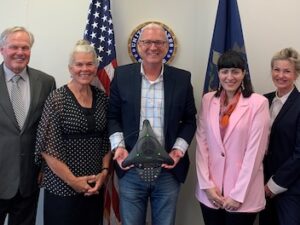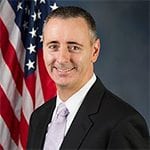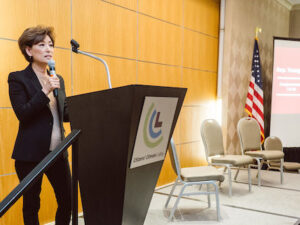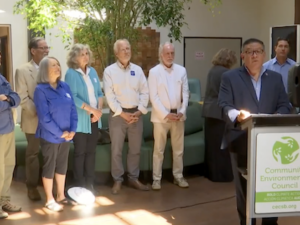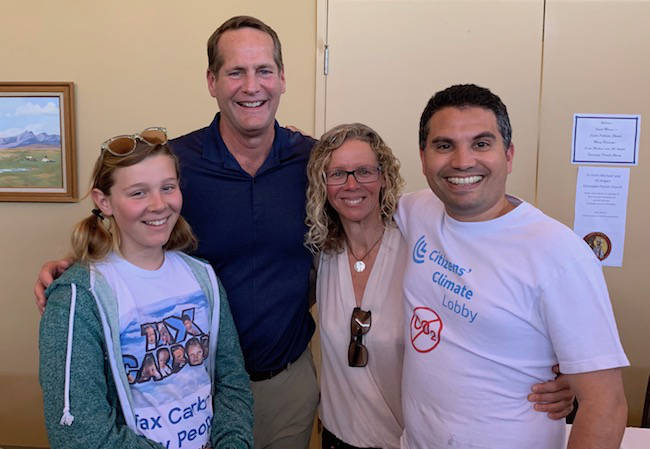
Rep. Harley Rouda (second from left) visits with some of his constituents and CCL volunteers.
By Bob Taylor
At our chapter’s April CCL meeting, our Congressman, Harley Rouda (D-CA-48), spent an hour with us discussing his commitment to climate action, including his decision to become a cosponsor of the Energy Innovation and Carbon Dividend Act (H.R. 763). For many chapter members who have worked for years to get a carbon fee and dividend bill in Congress, it was a day of immense satisfaction and jubilation.
We organized the hour with the congressman using the same roles we use in a CCL lobby meeting. The Appreciator thanked Rouda for supporting our bill. Discussion Leaders addressed bipartisanship and support from businesses, the military, and faith communities. The Deliverer presented letters of support from constituents. The Notetaker captured the conversation on paper. But it was the Asker who characterized the tone of this meeting. Because our new congressman is such an outspoken climate champion, all we could ask of him was to “Be himself.”
A shift in representation
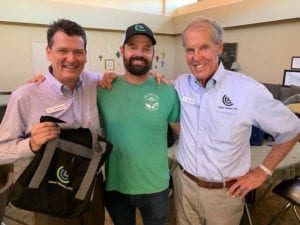
(L-R) CCL volunteers Craig Preston, Breene Murphy, and Mark Tabbert
It wasn’t always like this. Until Rouda’s election last November, our district was represented by an implacable climate denier who was in office for 30 years. Breene Murphy, our chapter’s liaison, along with others, still worked to build a relationship with him and encourage him to support our policy. “While it was frustrating,” Murphy says, “we learned a lot about speaking to the far right on climate change and working in a bipartisan manner.”
The contrast with our new representative could not be more sharply defined. Murphy confides, “The day that Harley wrote me to say that he would cosponsor H.R. 763, I was in my office, and I cried. As a father, I want to be able to provide a livable world for my son to live in, and Harley’s support made that possibility feel more real. I never thought my congressman would be so sensible and inspiring, and to play a small role, alongside such amazing people, humbled me to tears.”
Gaining the trust and respect of our new Congressman was no accident. Chapter members saw Rouda’s potential when he campaigned for election saying, “The number one issue facing humankind is climate change.” His campaign themes of “common sense for common ground” and “reaching across the aisle to get things done” resonated with us. A significant number from our chapter volunteered countless hours, many going door to door to introduce voters to this candidate. Many others contributed financially. When the election was won, Rouda and his staff could not help but see how important CCL volunteers had been to his success.
Messages from 100 days in
As Rouda sat with us, he was marking just 100 days in office. In that time, he has been assigned to two key committees: Transportation and Infrastructure, and Oversight and Reform. In the latter, he chairs the sub-committee on Environment, a position in which he not only commands the gavel, but also has subpoena power. This sub-committee is focused on climate change. He told us his first meeting reviewed what we know about climate change and when we knew it; the second will review the evidence of the human and economic damage global warming has wrought; and, the third will consider two paths forward: the “do nothing, apocalyptic one,” and the “path that transitions us away from fossil fuels to a clean energy economy.” He told us, “I don’t want to waste time pointing fingers and assessing blame. The way forward must be bipartisan.”
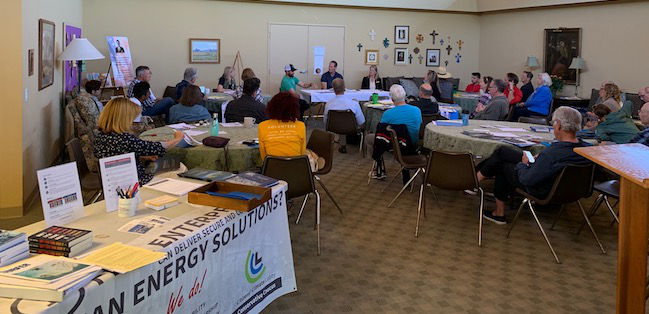
Rep. Rouda (back, center) and his district manager visit with chapter members.
Those in Congress who oppose climate action make two main arguments, according to Rouda. One has to do with the fears of high costs and economic stress which a transition from fossil fuels will entail. “They say, ‘How are we going to pay for it?’ I say, ‘We are already paying in health care costs, property damages, disaster relief, and higher mortgage and insurance rates. The costs are extraordinary and impact farmers, ranchers, homeowners and working families every day’” he explains. The other argument claims that as long as China and India keep doing what they are doing, anything the U.S does will be ineffective. Rouda counters, “Those who oppose climate action should be reminded that the U.S. Department of Defense has designated climate change as the number one national security threat. When putting together lobby delegations to visit those critics,” he suggests, “include a veteran to convey that message.”
“It’s very humbling to serve in the ‘People’s House’ knowing that Americans rely on members of Congress to address their hopes and aspirations,” Rouda shared. “The media focuses too much on differences and extremes in both parties.” He says he’s already seen some significant bipartisan cooperation, and he believes that Republicans and Democrats should focus on what we have in common rather than what separates us.
Keeping the momentum going
Shortly after Congressman Rouda signed on to the Energy Innovation Act, three other members of Congress from our county also became cosponsors: Gil Cisneros (D-CA-39), Katie Porter (D-CA-45), and Mike Levin (D-CA-49). Going forward, we will do all we can to grow more community support for these members’ climate actions, garner more endorsements from influential people and organizations, and help this bill move forward.
During his visit, Rouda asserted, “To get appropriate actions, you need the right incentives.” The Energy Innovation Act is all about the right incentives: an escalating fee on carbon pollution raises the costs of fossil fuels, incentivizing investments in clean energy; the monthly dividend protects low income families while incentivizing consumers and businesses to make clean energy choices; and, the carbon border adjustment incentivizes trading partners to adopt carbon pricing, affecting a truly global solution. As more and more members of Congress understand and embrace this policy, our hopes for a livable future will be realized.
Bob Taylor is a volunteer with CCL’s Orange County Coast Chapter in Southern California.

